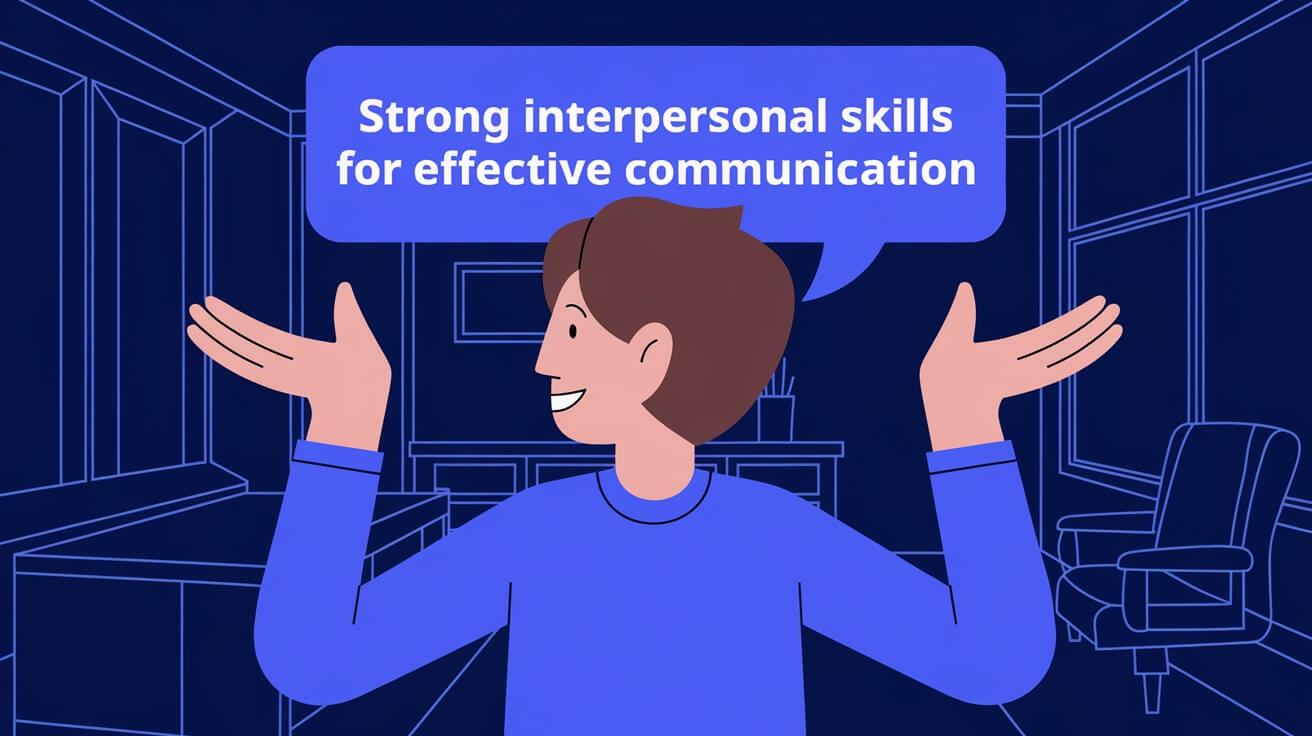
Strong Interpersonal Skills: The Essential Guide for Effective Communication
Introduction
Have you ever felt misunderstood in a conversation or struggled to get your ideas across in a group setting? These situations often rely on our interpersonal skills—the ability to communicate with others effectively. Strong interpersonal skills are more than just good conversation. They're about building trust, listening actively, and showing empathy. They enable us to resolve conflicts, work well in teams, and make meaningful connections in personal and professional settings.
This guide will examine strong interpersonal skills, their importance, and how to develop them. Understanding and practicing these skills, you'll be better equipped to handle challenging interactions, build stronger relationships, and communicate more effectively. Interpersonal skills aren't just a skill for the workplace; they're a foundation for connecting with people in all areas of life.
Interpersonal skills are the abilities that enable one to connect with others and communicate in a positive, effective manner. They include both verbal and non-verbal communication, empathy, and active listening. Strong interpersonal skills mean that you can understand others, make them feel valued, and interact in a way that fosters trust. They go beyond simple conversation; they create connections supporting productive teamwork and positive relationships.
These skills are significant at work and in every aspect of life. Good interpersonal skills make it easier to resolve conflicts with friends, communicate needs within a family, or even handle everyday interactions. They're essential for creating a collaborative environment and building credibility in the workplace. In short, interpersonal skills help us interact better and improve our relationships.

Key Components of Strong Interpersonal Skills
Developing strong interpersonal skills helps understand their core elements. Here are some of the most essential components:
Communication:
Effective communication is clear and respectful. It involves the words we use and our tone, body language, and facial expressions. Communicating well means expressing yourself clearly and making others feel understood.
Active Listening:
Active listening involves fully concentrating on the speaker, demonstrating engagement, and responding thoughtfully. Simple actions like nodding, making eye contact, and asking questions to clarify points can prove that you value what the other person says.
Empathy:
Empathy is the capacity to understand and connect with another person's feelings. It allows one to see situations from another person's perspective, which builds trust and deepens relationships.
Conflict Resolution:
Conflict resolution skills allow you to handle disagreements calmly and respectfully. This includes understanding both sides, managing emotions, and finding common ground without escalating the situation.
Collaboration and Teamwork:
Strong interpersonal skills also involve working well with others. Collaboration means being open to others' ideas, showing patience, and working toward shared goals. It's about being a good team player who contributes positively to the group.
Benefits of Developing Strong Interpersonal Skills

Developing interpersonal skills can have a positive impact on both personal and professional areas of liHere'sre's how:
Enhancing Workplace Relationships:
Good interpersonal skills help you build strong, positive relationships with colleagues, which creates a more supportive and enjoyable work environment. When people feel heard and valued, they're more motivated to collaborate effectively.
Building Trust and Credibility:
When you communicate openly and listen actively, you build trust with the people around you. This trust makes people more likely to approach you for advice, involve you in projects, and rely on your input.
Improving Team Performance and Productivity:
Teams that communicate well are more productive. Strong interpersonal skills help prevent misunderstandings, facilitate problem-solving, and create a balanced team dynamic.
Enriching Personal Relationships:
Strong interpersonal skills are essential in personal relationships. They allow you to connect with friends and family, resolve conflicts peacefully, and build enduring bonds.
Including strong interpersonal skills in your skill set can profoundly affect your career and personal satisfaction. Whether improving teamwork, reducing stress in relationships, or simply making daily interactions smoother, these skills improve life.
Practical Strategies for Building Strong Interpersonal Skills

Improving your interpersonal skills takes practice and patience. Here are some actionable ways to get started:
Improving Communication and Active Listening
Be Fully Present:
Put away distractions when speaking with someone. This shows respect and keeps you focused on the conversation.
Practice Open Body Language:
Maintain eye contact and avoid crossing your arms, which can appear closed-off. Open body language makes you seem approachable and engaged. Don't Interrupt: Let others finish their thoughts before you respond. By waiting until they're done, you show that you value what they say.
Exercises for Developing Empathy and Emotional Intelligence
Perspective-Taking:
When interacting with others, try to imagine their perspective. Think about how they might feel and what might be influencing their viewpoint.
Journaling:
Reflect on your conversations during the day, noting moments where you could have shown more empathy. This can help you understand how to be more considerate in future interactions.
Techniques for Managing and Resolving Conflict
Use "I" Statements: Instead of saying, “You never listen,” try, “I feel unheard when I can’t finish my point.” This reduces defensiveness and promotes constructive dialogue.
Stay Calm: Pause and take a deep breath before responding to a tense situation. Staying calm can prevent conflicts from escalating.
Ways to Foster Effective Collaboration
Encourage Input: Invite quieter team members to share their thoughts in group settings. This fosters a balanced environment and ensures all voices are heard.
Set Clear Goals: Collaborate on setting shared goals to keep everyone aligned and motivated.
Building these skills may take time, but they lead to more robust, more rewarding relationships in all areas of life.
Challenges in Developing Interpersonal Skills and How to Overcome Them
Strengthening interpersonal skills can be challenging. Here are some common challenges and how to handle them:
Addressing Common Barriers
Some people struggle with interpersonal skills due to introversion, shyness, or a lack of confidence. To overcome this, practice in low-pressure settings or start with small interactions to build comfort.
Overcoming Communication Anxiety
Communication anxiety can make it hard to interact openly. If you feel nervous, prepare beforehand by jotting down key points. Positive self-talk can also help improve confidence.
Strategies for Practicing and Gaining Confidence
Contact trusted friends or colleagues for feedback on areas where you could grow. Constructive feedback enables you to improve your approach and build confidence in your skills.
Developing interpersonal skills is a journey, and challenges are natural. Keep practicing, and these skills will become second nature over time.
Applying Strong Interpersonal Skills in Different Scenarios
Interpersonal skills are helpful in different contexHere'sre's how they apply in various scenarios:
Interpersonal Skills in the Workplace
Good interpersonal skills help foster clear communication and effective collaboration in a professional setting. They also make working as a team easier, resolve conflicts, and navigate challenging situations. For example, empathy during a feedback session helps you connect better with colleagues.
Building Strong Interpersonal Skills in Remote or Hybrid Settings
Remote work presents unique communication challenges. To avoid misunderstandings, make an effort to maintain regular check-ins with team members and use clear, concise language in written communication.
Interpersonal Skills in Personal and Social Life
Good interpersonal skills help you strengthen relationships with friends and family. Being a good listener, showing empathy, and communicating make interactions more fulfilling and help build lasting connections.
These versatile and adaptable skills make them valuable in nearly any situation involving interacting with others.
Conclusion:
Strong interpersonal skills are essential for building connections and fostering positive relationships. These skills can improve how you interact, handle conflicts, and build trust with others, whether at work or in your personal life.
Key Takeaways:
-
Interpersonal skills are rooted in communication, empathy, and teamwork.
-
Developing these skills can improve your relationships in every area of life.
-
Building these skills is a continuous journey—practice, reflect, and grow.
If you invest time in developing these skills, your interactions will become smoother, more meaningful, and more enjoyable.
Frequently Asked Questions (FAQs)
What are strong interpersonal skills?
Interpersonal skills involve effective communication, active listening, and empathy, allowing you to connect well with others.
How can strong interpersonal skills improve my relationships?
These skills help build trust, reduce conflicts, and improve collaboration, enhancing relationships in both personal and professional settings.
What exercises can help build interpersonal skills?
Practicing empathy exercises, active listening, and role-playing conflict resolution are effective ways to build interpersonal skills.
Why are interpersonal skills essential in the workplace?
Interpersonal skills strengthen teamwork, resolve conflicts, and foster a more productive work environment.
How can I measure progress in developing interpersonal skills?
To assess your growth, seek feedback, reflect on your interactions, and observe positive shifts in your relationships.
Life Skills Communication Skills




